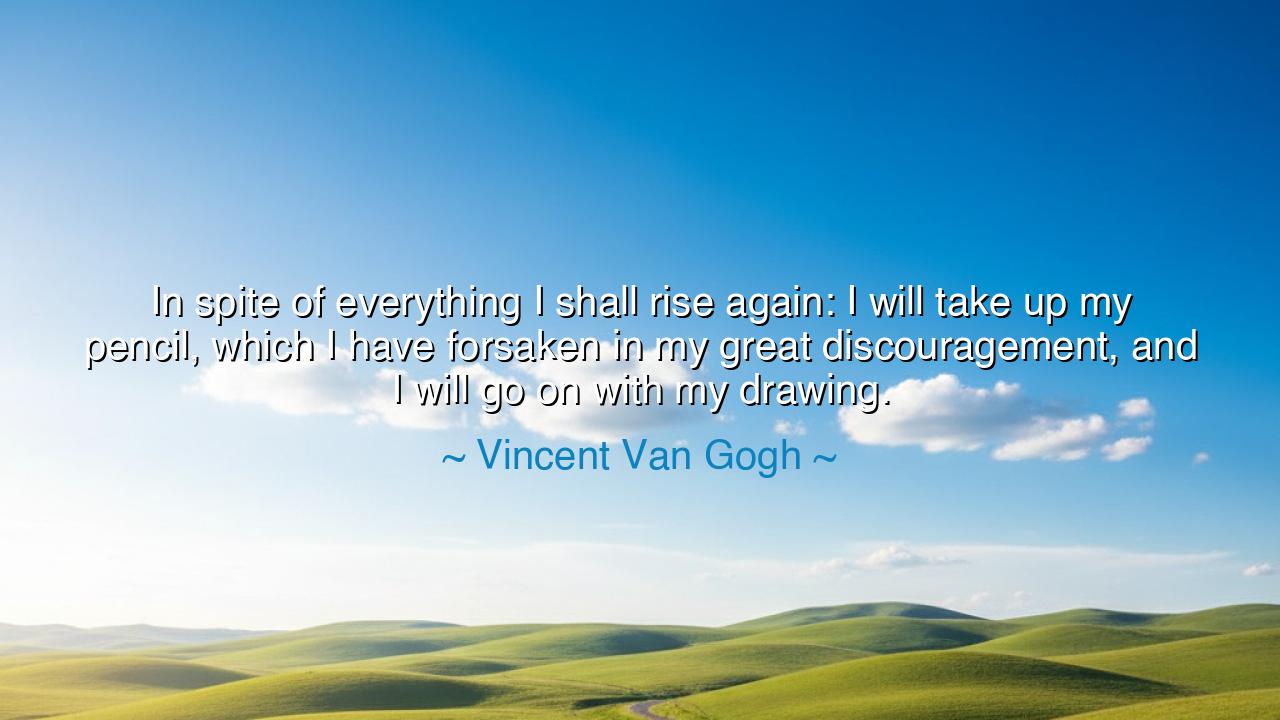
In spite of everything I shall rise again: I will take up my
In spite of everything I shall rise again: I will take up my pencil, which I have forsaken in my great discouragement, and I will go on with my drawing.






“In spite of everything I shall rise again: I will take up my pencil, which I have forsaken in my great discouragement, and I will go on with my drawing.” — Vincent van Gogh
In this aching and luminous declaration, Vincent van Gogh, the painter of souls and the poet of color, bares the human heart in its purest form—broken yet unyielding. These words, written in one of his many letters to his beloved brother Theo, rise like a phoenix from the ashes of despair. They reveal the artist’s eternal struggle: to fall into darkness and yet to reach once more toward light. When Van Gogh says, “In spite of everything I shall rise again,” he is not merely speaking of art, but of the spirit’s defiance against hopelessness, of the sacred impulse that drives creation even when all joy seems lost. His “pencil,” though simple, becomes a sword—his instrument of resurrection.
The origin of this quote lies in a period of deep turmoil in Van Gogh’s life, when poverty, loneliness, and rejection had nearly silenced his will to paint. He had faced years of failure and misunderstanding, his art dismissed as strange, his spirit wounded by illness and isolation. Yet, even from the pit of his despair, he found within himself a spark that would not die. It was the divine whisper of purpose—the call of the artist that said, “Begin again.” And so he did. With trembling hands, he picked up his pencil and continued his sacred work. Out of that struggle came the masterpieces we now revere—the stars that swirl in The Starry Night, the golden fields of Arles, and the tender sorrow of The Potato Eaters. His triumph was not in fame or fortune, but in the courage to create when creation felt impossible.
This quote speaks to the timeless rhythm of human existence. Life is a cycle of breaking and mending, of losing and finding again. The true measure of a soul is not how often it falls, but how steadfastly it rises. Van Gogh, in his pain, gives voice to what every creator, every dreamer, every weary heart has felt—the weight of discouragement and the quiet decision to begin again. His pencil represents more than art; it is the symbol of every purpose we are tempted to abandon when life grows cold. To take it up again is to choose faith over despair, creation over surrender, and love over fear.
There is a story in the annals of invention that mirrors this truth. Thomas Edison, after countless failures in his experiments, was once asked how he endured so much defeat. He replied, “I have not failed. I’ve just found ten thousand ways that won’t work.” Like Van Gogh, he too rose from the ashes of discouragement and carried on with his “pencil”—his tools of creation. Both men understood that genius is not brilliance alone, but endurance in the face of despair. They remind us that our failures do not define us; our refusal to give up does.
Van Gogh’s words also carry the quiet power of humility. “I have forsaken my pencil in great discouragement,” he admits. There is no pretense here, no denial of weakness. He does not pretend to be unbroken; he acknowledges his fall, and in that honesty lies his strength. For the act of rising is made sacred by the truth of one’s fall. The proud may not endure, but the humble endure and become eternal. The artist who admits his despair can transform it into beauty; the soul that confesses its weariness can be filled again with hope. Thus, Van Gogh teaches that even in our lowest hour, we are never truly lost—only waiting to be reborn through the courage of a single choice: to continue.
The lesson, then, is one for all generations: when despair whispers that your efforts are in vain, remember the hand of Van Gogh trembling over his canvas, painting light out of darkness. When you feel that your dreams are too far gone, recall that he, too, felt abandoned, yet his art now illuminates the world. The act of beginning again, however small, is the mightiest rebellion against defeat. The moment you lift your own “pencil,” whatever form it takes—a brush, a word, a kindness, a prayer—you join the company of those who chose perseverance over oblivion.
So, O seeker of truth and creator of tomorrow, take this as both comfort and command: rise again. No matter how heavy the silence, no matter how deep the night, lift your hand, take up your pencil, and begin once more. For within that act lies redemption. As Van Gogh rose, so can you. From despair can come beauty, from ruin can come strength, and from a forsaken pencil can emerge the light that awakens the world.






AAdministratorAdministrator
Welcome, honored guests. Please leave a comment, we will respond soon